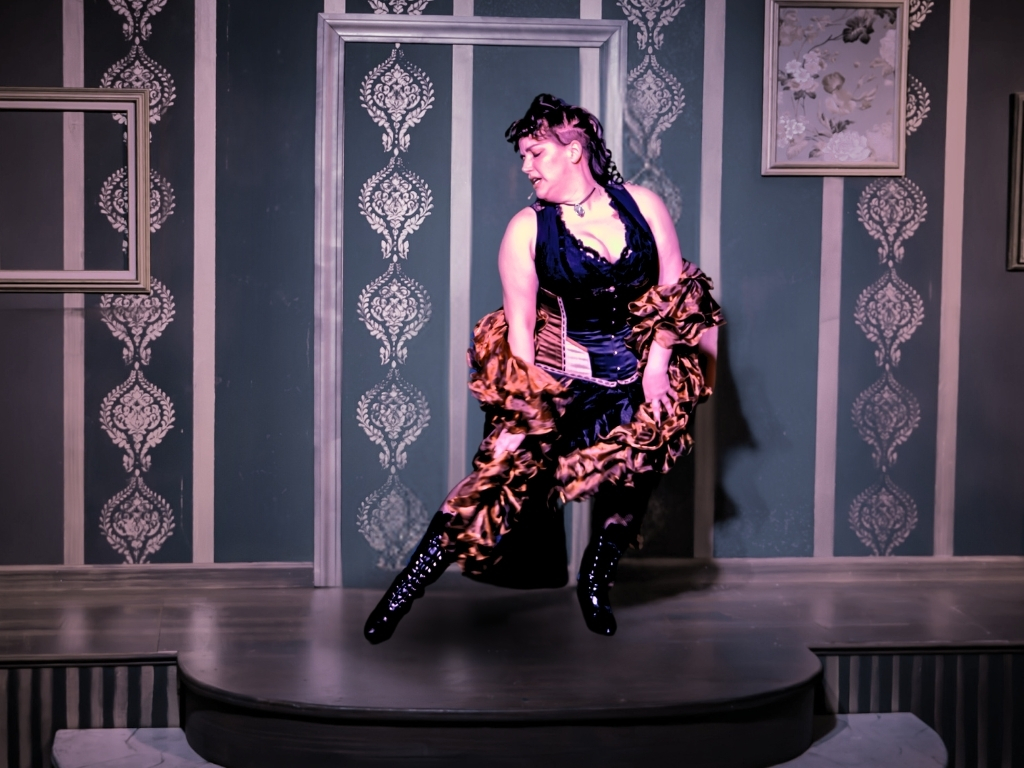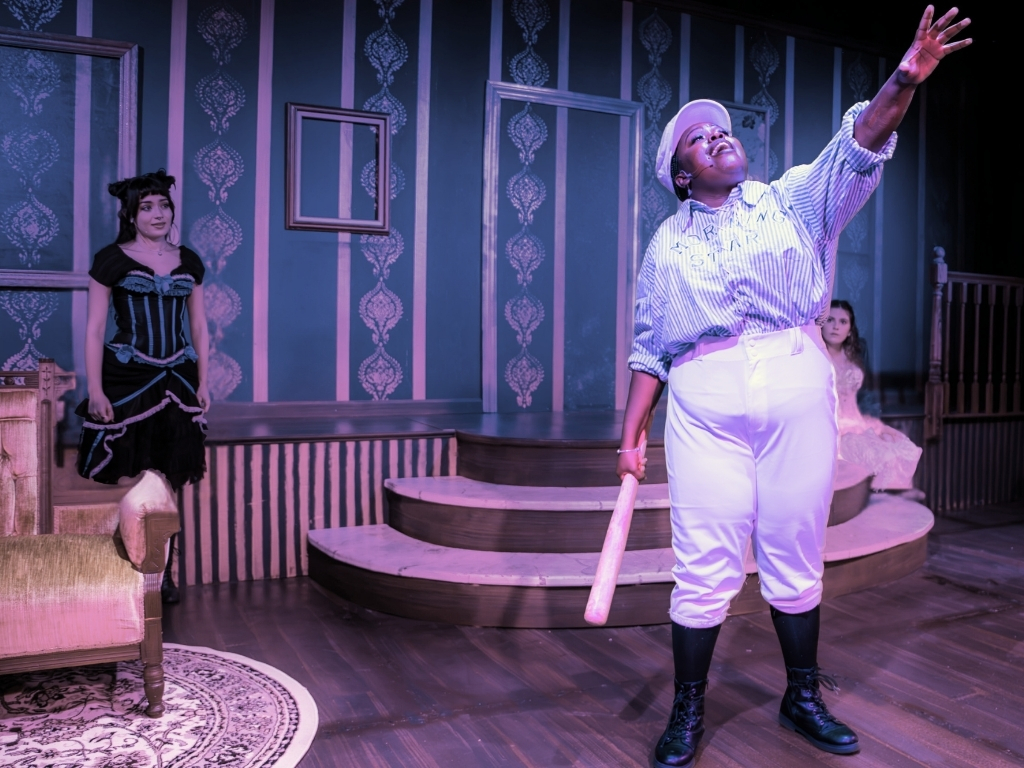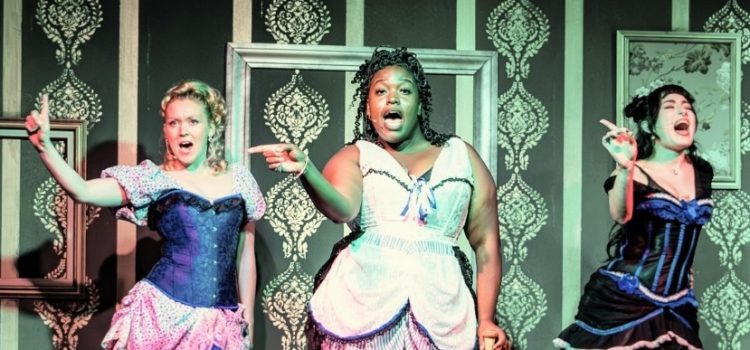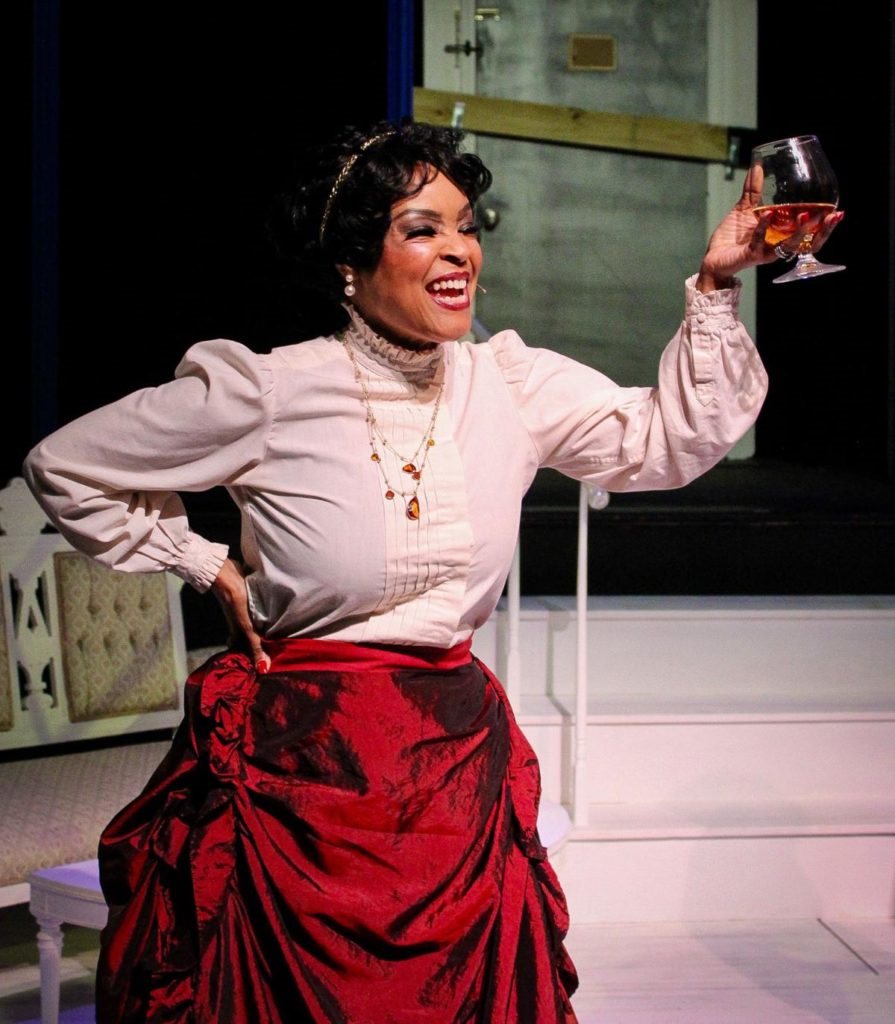By Lynn Venhaus
Spotlighting attitude and intrigue, a still-vivacious “Madam” has been nipped, tucked, and excised into a promising female-forward musical focused on womanhood’s advancement in this third go-round.
At the center is a fascinating account of Eliza Haycraft, one of St. Louis’ most notorious businesswomen, who ran a brothel and was known for her philanthropy in the late 19th century.
Born in 1820, Haycraft arrived destitute in St. Louis at age 20. She couldn’t read or write. Eventually, she bought commercial and residential property, then rented it back out.
A champion of ordinary folk, she was loved by the public, helping the poor and offering financial aid. During and after the Civil War, she supported widows and orphans affected.
The opening song, a statement, “Empire” touts her achievements building her business, and Haycraft became the wealthiest local woman during the Reconstruction Era. The tribute is the show’s catchiest earworm and emphasizes modern sensibilities.
“Madam” takes place during the last year of her life – Haycraft died in 1871 at age 51. She still had enough gumption to fight to be buried in Bellefontaine Cemetery. (She won, but to date, her grave doesn’t have a headstone).

But despite the passage of The Social Evils Act of 1870 making her business legitimate for a brief time, she was shut out of polite society, even with the town’s upper crust, political bigwigs and business scions her patrons. Ye olde double standard.
In fact, the law was detrimental to the women – denied habeas corpus (unlawful detention) to women arrested for prostitution and had a fee/tax instituted, not to mention unlimited police power to search homes and people. Aren’t we having this discussion now about who has control over women’s bodies?
The women who worked for Eliza that she nurtured and took good care of get more attention this go-round. Their personal experiences are woven in, and Haycraft seems more of a supporting – but integral – role.
As she has in all three versions, Kimmie Kidd owns the role, and commands the stage. Kidd is well-known for her star power on local stages, and she shines here as a smart, pragmatic, trailblazing woman. She has two richly textured solos – “Friends” and “Dinner for One.”
Kidd knows how to sashay and make her mark. She also joins her girls in a robust “The Grateful Imposter” finale.
Taken under her wing are a spunky quartet – Adrienne Spann as gutsy Billie, Lillian Cooper as naïve Tennie, Avery Lux as agreeable Ripley, and Rachel Bailey as jaded Calista bring sass and spirit to the working girls.

They are also devoted to Eliza, as their song “It’s Because of Eliza” indicates. Haycraft empowered them by allowing them to refuse service to anyone. She had three simple rules: Respect, Consent and Pay Up Front. She also believed “No debts among women.”
They support themselves through prostitution but assert independence at a time when they have few legitimate rights. Girl power ahead of its time, and this show leans into that.
Adrienne Spann, whose star is on the rise, brings ambitious Billie to vivid life in such songs as “Another Fence” and her solo “Joy.” Her character is a composite of historically strong women, including an escaped slave who disguised herself as a man to fight in the Union Army.
Rachel Bailey has found a niche in playing outspoken, sagacious women, and Calista is a bold version of that. Her spidey sense is revealed in an exchange with Mercy that leads to the new number, “La Fille Evanouie.”
Think of Calista as the tough-love mom with a world-weary view of life, but ever the intuitive and shrewd woman looking out for herself.
With Calista, the feisty group numbers include “Special,” “The Great Imitator,” “It Feels So Good” and “Another Pastime.”

The young Tennie and Ripley appear to be squabbling, but through their journey, grow up under the ladies’ influence. Their characters are not as distinct as the others, but Lillian Cooper and Avery Lux are energetic, enthusiastic performers.
The new downtrodden kid in town, actress Mercy Jones, is hiding a secret, but Madam takes a shine to her, and she ingratiates herself into the quarters. They all have one thing in common, though – dreaming of a better life.
Jade Cash is mysterious as Mercy – we are kept off-guard but sense her conflicted nature. She announces her intentions in her solos “Man with Money” and “Star.” She joins the working girls for the playful “Love is Work.”
When she has a change of fortune in the second act, she joins the girls in the opener “Mercy’s Empire.”
Unbeknownst to the other girls, Mercy is the sister of The Benefactor, an over-the-top villain modeled after dastardly vaudeville archetypes. In a departure from his usual likable protagonist roles, Dustin Petrillo oozes unctuousness, no scruples detectable.
He lusts after the downtown property so he can amass more power through the St. Charles Street real estate, and resorts to nefarious tactics. Petrillo is dynamic – and depraved — in “All the Money in the World” and duets with Kidd in the power play “All of This Goes Away.”

Accomplished composer Colin Healy and his dedicated creative partner, multi-faceted Bradley Rohlf, have rewritten, reworked and re-mounted the musical at their Greenfinch Theater and Dive Bar for Fly North Theatricals.
It’s Healy’s sixth original musical, and he not only wrote the music, infusing the score with St. Louis-flavored blues and jazz, but also the lyrics and book.
After a workshop at COCA, the musical was staged in 2019 at the Bluff City Theater in Hannibal, Mo., which commissioned the work. Fly North mounted it here in January 2020 at the .Zack.
This update has slashed six songs and reconfigured others to make the show tighter. While the vocalists harmonize well, one of the drawbacks was the sound was too loud for the space during Saturday, July 26, presentation.
That, and this current reliance on singers trying to be powerful when in fact it becomes a cross between screaming and belting, or ‘screlting,’ to the detriment of pleasant-sounding melodies.
The repetitive nature of this new direction detracts from the likable performers’ commitment to their parts, not to mention strain on voices.
The streamlined musical numbers also benefit from Cady Bailey’s choreography, with an exceptionally skilled Lux standing out as a well-trained dancer.
While the songs have strong rhythmic hooks and clever lyrics, the book could still use some tweaking. A few plot threads are muddled, including Calista’s illness (real or fake?) , what is so attractive about Eliza’s location and some unanswered questions in a desire to wrap the show up.

In the two previous versions, Mercy and The Benefactor were husband and wife. This version is stronger by making them siblings.
For this production, director Sam Hayes keeps the pace brisk, the women alert and enabled, and makes sure each has moments to shine.
As costume designer, too, they also adorned the characters in eye-catching finely textured outfits and finery that enhances the show’s visual appeal.
Healy is the musical director and Rohlf is the technical director and lighting designer. Both worked on the set design, which created a homey, cozy feel with a parlor and bedroom for Calista in the intimate space.
Katie Orr painted the set with its intricate stencil work, Kel Rohlf gathered the period props, and Dizzy Funke was production and stage manager, with Dereis Lambert production assistant and light board operator. Aslyn Damerval was the dramaturg and Rhiannon Creighton the intimacy coordinator.
Shining a spotlight on a prominent but little-known 19th century woman, “Madam” is an alluring musical that draws potency from its modern parallels. The one-of-a-kind Haycraft is worth researching to find out more about a well-lived life.
A lovingly crafted piece presented with sincerity and obvious talent, one hopes it finds a way to flourish and prosper, much like the title character deserved.
Fly North Theatricals presents “Madam” from July 25 to Aug. 10, with performances at 7:30 p.m. Thursday through Saturday and 2 p.m. Sunday at the Greenfinch Theater and Dive Bar, 2525 Jefferson Avenue. For more information, visit www.flynorth.org.


Lynn (Zipfel) Venhaus has had a continuous byline in St. Louis metro region publications since 1978. She writes features and news for Belleville News-Democrat and contributes to St. Louis magazine and other publications.
She is a Rotten Tomatoes-approved film critic, currently reviews films for Webster-Kirkwood Times and KTRS Radio, covers entertainment for PopLifeSTL.com and co-hosts podcast PopLifeSTL.com…Presents.
She is a member of Critics Choice Association, where she serves on the women’s and marketing committees; Alliance of Women Film Journalists; and on the board of the St. Louis Film Critics Association. She is a founding and board member of the St. Louis Theater Circle.
She is retired from teaching journalism/media as an adjunct college instructor.






